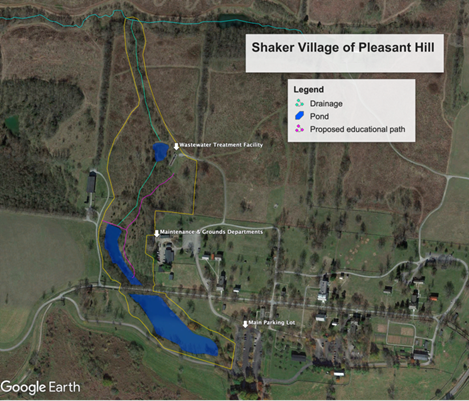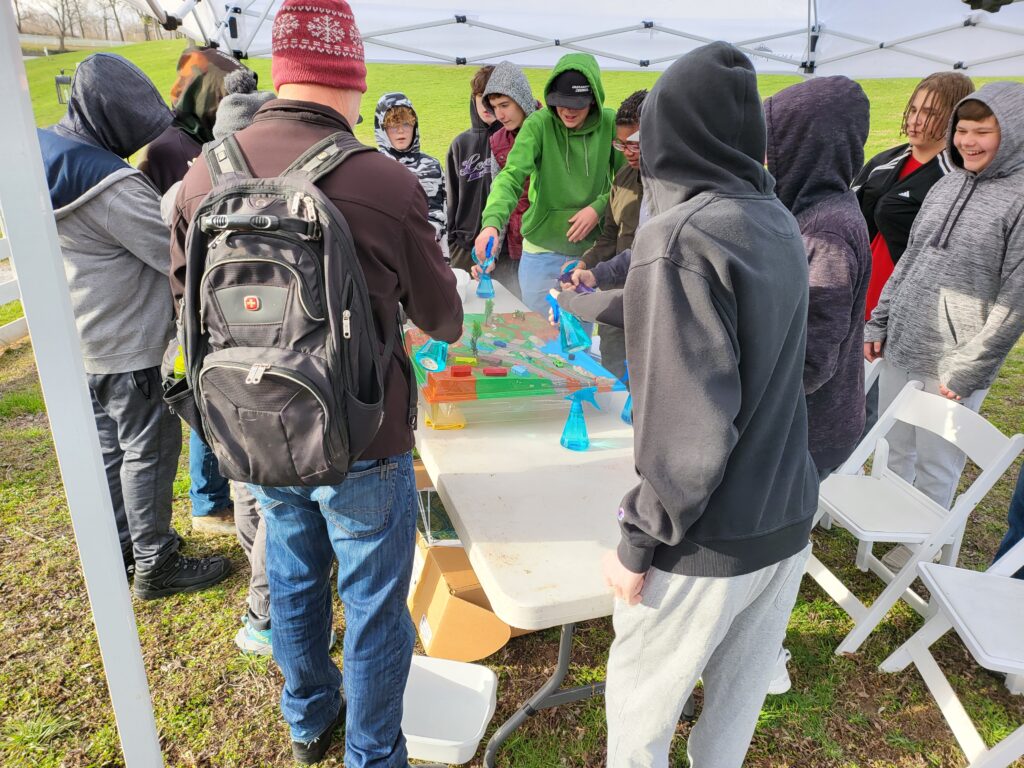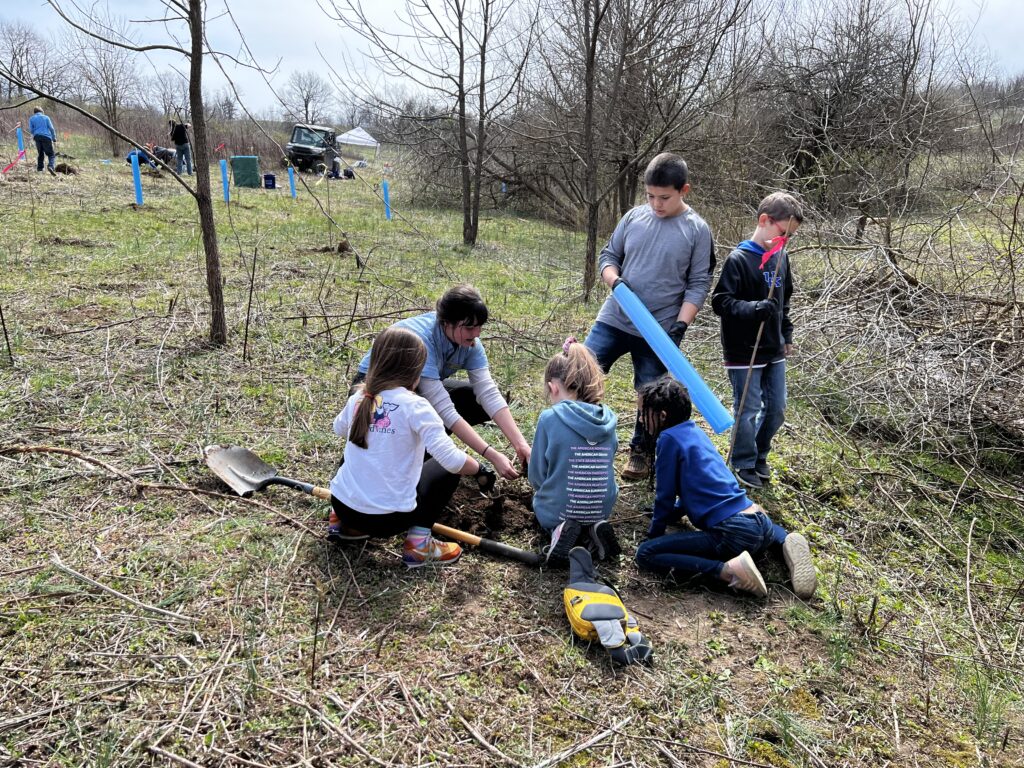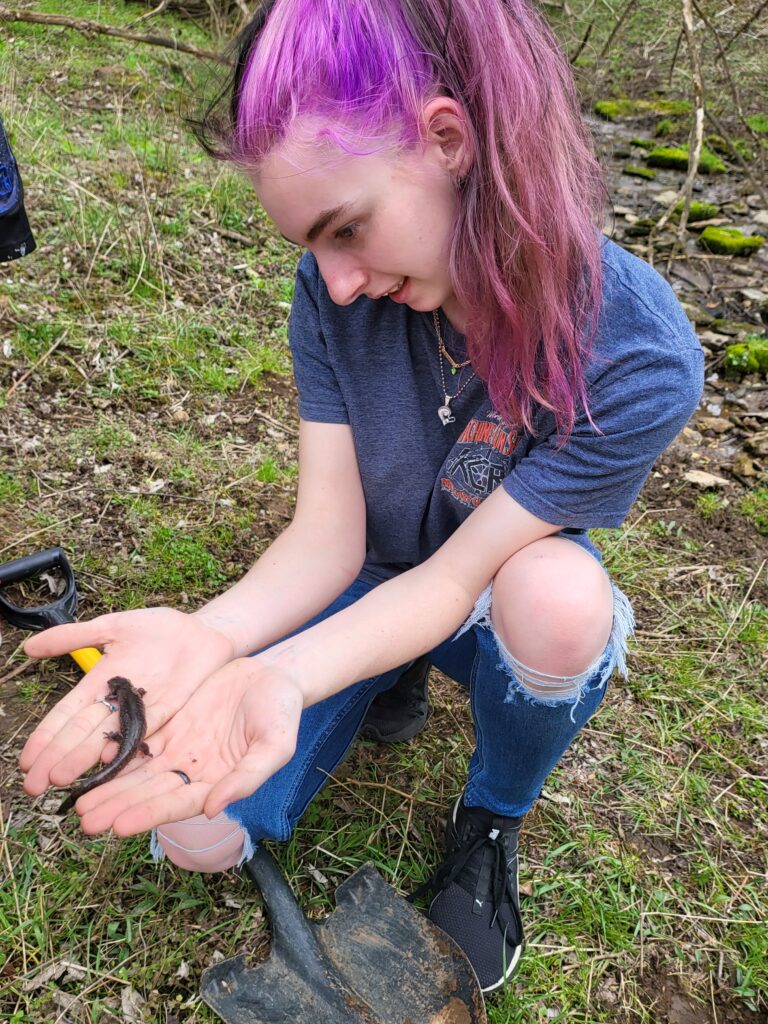Pony Meyer, Program Specialist
Laura Baird, Stewardship Manager
Shaker Village boasts 2,000 acres of Nature Preserve full of educational potential. We host a variety of environmental education opportunities through our discovery treks and seasonal guided hikes; however, part of the challenge in harnessing this potential for larger school groups is access. Recently, we have started to expand our environmental education field trip offerings by improving access to natural areas closer to the Village center. To do this, we secured an 18-month grant from the National Fish & Wildlife Foundation (NFWF) to fund pond restoration, habitat improvement and environmental education opportunities in a specific project area.
Learn more about school programs at Shaker Village here.
NFWF Five Star & Urban Waters Restoration Program Grant
In Fall 2022, we received a Five Star & Urban Waters Restoration Program Grant from the NFWF. This grant funded habitat improvement, pond restoration and environmental education in a 20-acre area of early successional forest and wetland habitat.
This upland drainage includes three historic farm ponds, the largest of which was built in 1837 and is a 2.5-acre pond stocked for catch-and-release fishing. The Shakers called this pond the “Big Pond” or “West Pond.” Historically, it was an important source of water and ice for the Shakers, especially during periods of drought. The smallest pond in the project area is roughly 0.2 acres and catches water released from an on-site wastewater treatment facility. The project also includes the small stream that connects these ponds and the remaining length of this drainage until it connects to a tributary of Shaker Creek, which drains into the Kentucky River after approximately 4.5 miles.

Restoration and Habitat Improvement
For habitat improvement, the project focuses on the removal of invasive plants such as bush honeysuckle and garlic mustard as well as replanting native species selected to support birds and pollinators. Both the Preserve and Program departments, as well as community volunteers and Mercer County students have played an integral part in this stewardship.
Upland streams, headwaters and wetlands are considered priority habitats in Kentucky’s State Wildlife Action Plan and many of the birds who utilize this habitat are considered priority species in this area of the state. This project builds upon previous work completed on property to improve the habitat and the quality of the watershed. Since 2009, more than 1,000 acres of surrounding fields at Pleasant Hill have been converted from modern farmland to native shortgrass prairies and managed for grassland bird diversity.
Click here to learn more information on the land conservation efforts in the Preserve at Shaker Village.
Environmental Education Programs for Mercer County Students
NFWF also funded the development of two environmental education programs in this project area specifically for students in Mercer County, Kentucky:
- Pond Restoration, Habitat Improvement, and the Importance of Native Plants
- Water Quality Testing in Shaker Village Ponds
Over the winter of 2022-2023, Shaker Village of Pleasant Hill’s Program and Preserve teams developed these stewardship programs; ran a teacher focus group for participating teachers; and cleared a temporary hiking path through the area. In the spring of 2023, we piloted and launched the two new programs for grades 3-12. We ran 11 programs with nine different teachers and provided programming for 174 students! Students from Burgin Independent and Mercery County High School used a hands-on 3D model to explore how watersheds work and the impact of possible pollutants. Hiking a little over a mile through the project area, students also performed water quality testing in two Shaker Village ponds and planted native trees/shrubs in riparian areas. Students learned how Best Management Practices like planting native plants and vegetation buffers near our waterways help mitigate non-point source pollution.

Students planted a variety of bareroot native trees and shrubs including Flowering Dogwood (Cornus florida), Common Persimmon (Diospyros virginiana), Silky Dogwood (Cornus amomum), Arrowwood Viburnum (Viburnum dentatum), American Hazelnut (Corylus Americana), Eastern serviceberry (A.canadensis), American witch hazel (Hamamelis virginiana), and Common Buttonbush (Cephalanthus occidentalis). Students also placed tree protectors (blue tubes pictured) to protect the young trees from the elements and from foraging deer.


What’s Next?
Beginning this fall, the Program team will continue running these two stewardship programs where students from Mercer County will have the opportunity to test water quality, plant native plants and explore the Nature Preserve. The Preserve team will continue working on establishing the educational foot trail while the Program team will also be working on interpretive signage in this area including information on the Shaker Village wastewater treatment plant. Looking to 2024, Shaker Village plans to offer these two programs as educational field trips for students in our state and region. Please keep an eye on our school programs webpage as we continue to expand our environmental education offerings in this project area and beyond!